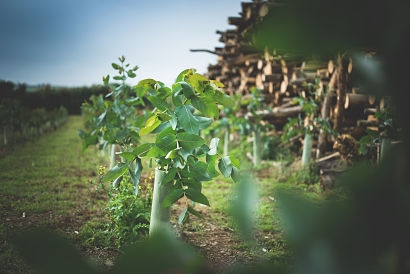
The business began in 2014 when work began to diversify the hardwood species grown on the farm. Approximately one tonne of carbon is stored for every two to three cubic metres of eucalyptus grown. The eucalyptus plantation at Treworder Farm is currently absorbing around 200 tonnes of carbon dioxide per annum.
All wood produced at Wildwood is dried in a kiln, powered by a biomass boiler. The boiler is fuelled by waste wood from the logging process, making the whole operation carbon neutral. The kiln-drying process reduces the moisture content of the wood to less than 20%, meaning it will burn cleanly without releasing soot or causing tar build ups.
“Eucalyptus trees are the world’s most widely planted plantation species - and for good reasons” said Hugh Davis, who runs Wildwood with his wife Tina. “They grow very quickly compared to other trees - at a rate of up to 40 cubic metres per hectare per annum, compared to around 12 cubic metres for pine, or four cubic metres for ash and oak. Eucalyptus wood also has a high density, which translates to a high calorific value - meaning it burns hot and you will need less wood to generate the same energy. Combined with positive environmental factors, we saw a fantastic opportunity to start producing the incredible trees here in the UK.”
Bryan Elliott of Eucalyptus Renewables - a company set up to deliver a sustainable supply of eucalyptus species to the forestry industry – added that with a shining example of the UK’s first commercial eucalyptus plantation, Hugh is leading a national evolution towards an integrated land use policy through diversified income streams, while growing a sustainable crop with sound silvicultural and ecological credentials.
“The work being done at Treworder Farm will have a genuinely positive impact on the planet” Mr Elliott said.
For additional information:

